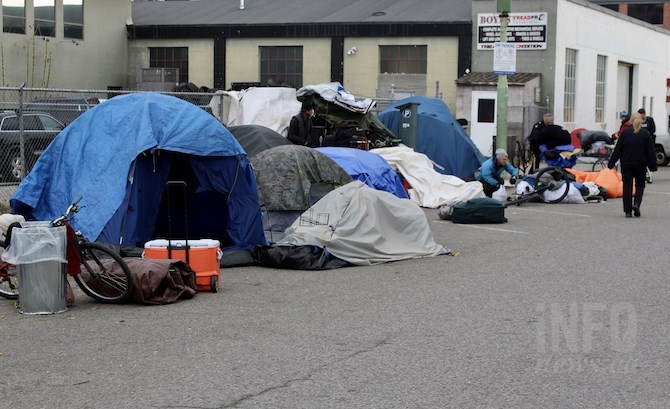With the death of Journey Home it’s unclear how Kelowna will tackle homelessness in the future

Kelowna's Journey Home initiative was created in 2018 with the goal of transforming Kelowna to a city with functionally zero homelessness by 2024.
Instead, as of Jan. 1, 2024, the city’s agreement – along with its partial funding – ends and the job reverts back to City Hall, following dramatic increases to the number of people living without proper roofs over their heads.
What will become of the society is unclear.
Scott Lanigan, who was on the original task force, is listed on the society’s website as board chair. He did not return repeated calls from iNFOnews.ca asking for an interview.
Also among the two dozen members of that original task force is now-Mayor Tom Dyas, who also is not commenting on what went wrong and what the city is planning to do to right the floundering ship.
“Would you be able to reach back out on this in the New Year?” City of Kelowna communications officer Christie Judson asked in response to an email from iNFOnews.ca asking for an interview. “The mayor would be happy to meet with you on it then.”
By the New Year, of course, Journey Home will be no more.
READ MORE: Why Journey Home has run its course in Kelowna
Heads of key “social serving” agencies in the city also did not respond.
The one person who did consent to an interview was Colleen Cornock, essentially, the new face of Journey Home at City Hall.
She took on the job of social development manager in July after serving as the city’s crime prevention supervisor.
“The change is happening because we’ve heard from community that there is a desire for a greater involvement from the city to take a leadership role in advancing the ways we address complex social challenges in our community, such as homelessness,” she said, disagreeing with the suggestion that Journey Home was a failed experiment.
“What I would say is, it’s really not about that. It’s that we’ve had extensive issues for our community that weren’t necessarily present when the strategy and the society were formed in 2017 and 2018.”
That certainly is true, not only of Kelowna but Canada and North America in general.
Back in 2018, there were a handful of people sleeping rough on Kelowna streets and concealed in bushes.
By the fall of 2019 there were dozens of people camped out along Leon Avenue, mostly in front of the Gospel Mission homeless shelter that was so full that another shelter, Cornerstone, operated by the John Howard Society, had opened just down the street in 2017.
In December 2019, city crews moved in and forcibly removed those campers and allowed them to set up in an old ball field on Recreation Avenue in the city’s North End, amid a blaze of media attention.
READ MORE: Shutdown of Kelowna homeless tent city catches campers by surprise
Since then, various temporary emergency winter shelters have come and (mostly) gone and the tent camp has moved to stretch along the Rail Trail east of Richter Street.
Initially, campers were required to pack up their tents and belongings each morning, put them in storage for the day, and go about their business somewhere else before returning for the night.
But, in the four years since that first camp was set up with a dozen or so tents, it has grown to closer to 100 that are now only forced to move every couple of weeks for a general area cleanup.
There are currently about 250 people sleeping rough in Kelowna on any given night, not to mention another 200+ in various emergency shelters and 300 in supportive housing complexes built to much controversy since 2019.
With the high cost of housing, rent and food, those numbers keep growing as more and more fall into homelessness. All too often those are seniors and people with disabilities.
So, what’s the new plan?
No one seems to know.
“The city has a memorandum of understanding with the Journey Home Society that lasts until the end of this calendar year so their work is still taking place and my role with the society is around what that transition piece looks like,” Cornock said. “Where will the data go and how will that work continue going forward and how can we ensure that there’s a smooth transition between the work they’ve been able to advance since their establishment and the city, which is now taking a leadership role in being that backbone going forward.”
The city’s budget, which will be discussed by city council later this week, earmarks $750,000 to deal with homelessness in 2024 but that’s not itemized and Cornock could not talk about it prior to council making decisions.
And how the city will become the “backbone” organization is also subject to discussions which, to this point, have focused on talking with the social service agencies but will provide opportunities for public input in the coming months.
“What the community can expect is a conversation about what does it mean for the city to transition into the role of a backbone organization,” Cornock said. “What are the key focus areas for social development as it relates to housing and homelessness?”
Journey Home was set up to be the backbone and did some good work in its time, she said, although a lot of its work was done in collaboration with city staff so it’s hard to say who led which initiative.
“Earlier this year, we had an independent review from a consultant of the Journey Home Society from the community’s perspective,” Cornock said. “What we heard from that is, the society had strength in data transformation and outreach coordination and they had a very strong role and a strong voice in our community about the realities around homelessness, which so often gets lost in conversation, so they were a lead in that.”
Every morning city bylaw officers do an informal count of how many people are sleeping rough.
Following on initiatives in other jurisdictions, a “by name” list was created to identify who was homeless and to coordinate with service agencies to minimize, for example, duplication of efforts by outreach workers.
Journey Home, for its part, worked with the agencies – some of which operated with pen and paper data collection systems – to set up templates to help co-ordinate those efforts.
It also played a strong role in advocating with senior levels of government, Cornock said.
But when it came to getting supportive housing or emergency shelters, that was more of a coordinated effort.
The idea for the most recent initiative – building 120 tiny homes for the homeless – came from the city, Cornock said.
READ MORE: Another site for a tiny home village for homeless in Kelowna selected
While much of the discussion in the past has been about homelessness, Cornock sees her role as more than just that single issue.
“Social development has a scope that is larger than just a homelessness response,” she said. “When we look at what is the scope of social development, it’s really the projects and programs that elevate community wellness. It will be homelessness but it also has the potential to be much more than that going forward.”
That will mean advocating with the provincial government, for example, for better rental supports in high-rent areas like Kelowna.
It also means working with other city departments on issues like increasing the supply of affordable housing.
“It’s all work that is aligned with what the next steps should be, and need to be, for social development and a reset of the Journey Home strategy,” Cornock said. “We are already working with policy and planning (departments), to make sure our next steps for Journey Home aren’t done in a silo.
“There will be more community collaborations in the New Year with front line industries that work in this space so it is a bit early to say exactly what are the buckets of work that will happen in here, but the community can expect a stronger role by the city as a leader in this realm.”
To contact a reporter for this story, email Rob Munro or call 250-808-0143 or email the editor. You can also submit photos, videos or news tips to the newsroom and be entered to win a monthly prize draw.
We welcome your comments and opinions on our stories but play nice. We won't censor or delete comments unless they contain off-topic statements or links, unnecessary vulgarity, false facts, spam or obviously fake profiles. If you have any concerns about what you see in comments, email the editor in the link above. SUBSCRIBE to our awesome newsletter here.



